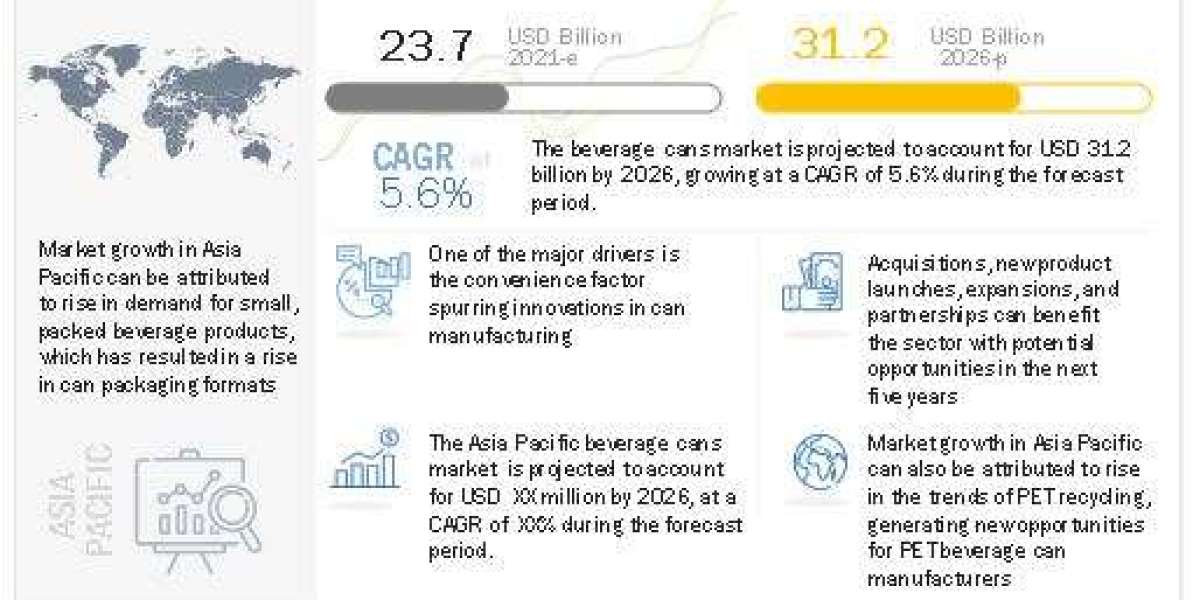The beverage cans market was valued at USD 23.7 Billion in 2021 and is projected to reach USD 31.2 Billion by 2026, expanding at a growth rate of 5.6% during the forecast period. North America dominated the beverage cans market. The rise in the production of alcoholic beverages, such as beer and ready-to-drink cocktail products, has resulted in premium packaging solutions, thereby triggering the demand for cans.
The non-alcoholic beverage segment by beverage type is projected to achieve the largest growth in the beverage can market.
The non-alcoholic beverage segment dominated the market. The rise in the production of carbonated soft drinks has resulted in the dominance of the non-alcoholic beverage segment. From the consumer side, there is a significant increase in the demand of sports drinks and energy drinks will also boost the market of non-alcoholic beverages globally.
Download PDF brochure: https://www.marketsandmarkets.com/pdfdownloadNew.asp?id=226901632
By structure, the 2-piece segment is projected to account for the fastest growth in the beverage can market
2-piece food cans are lightweight and available with a stackable feature, because of which they can save shelf space. With a continuously evolving packaging technology, the structure of the cans has also been improving with seamless can body and ease of printing on full cans; hence, 2-piece cans are estimated to replace 3-piece cans. These all factors support the high growth rate of 2-piece segment globally.
The aluminium segment by material type is projected to account for the largest growth of the beverage can market over the forecast period
Alunimium segment is the largest segment for the beverage cans market by material type owing to its cost effectiveness and properties. Aluminum is a very cost-effective raw material used in industry and can customize the packaging with colors, 3D prints, and embossing. Therefore, technological developments have led the manufacturers to remodel their strategies by using various sizes of cans, along with different shapes. Aluminum cans are convenient to keep in the fridge and ovens.
Asia Pacific is projected to be the fastest growing market
Asia Pacific accounted for greater growth in the global cans market for beverages during the forecast period. Countries, such as China and India, have significantly contributed to the growth of the cans market for beverages in the Asia Pacific region. These countries have a high population density and are the leading producers of fruits. These factors are projected to drive the demand for beverages such as juices and functional drinks in the region.
Key Market Players
The key players in this market include Crown Holdings Inc. (Philadelphia, US), ArdaghGroup S.A, (Luxemburg), CPMC Holdings Limited (China), Toyo Seikan Group Holdings Ltd. (Tokyo, Japan), Can-One Berhad (Malaysia), Can-Pack S.A (Poland), Ball Corporation (Colorado, US), Envases Universales (Spain), Universal Can Corporation (Tokyo, Japan), Interpack Group Inc. (China), GZ Industries (Nigeria), Showa Denko K.K (Tokyo, Japan), Swan Industries (Thailand) Limited (Thailand), Nampak Bevcan Limited (South Africa), The Olayan Group (Saudi Arabia), and Techpack Solutions Pvt Limited (Seoul, South Korea).
Request Sample Pages of Report: https://www.marketsandmarkets.com/requestsampleNew.asp?id=226901632












